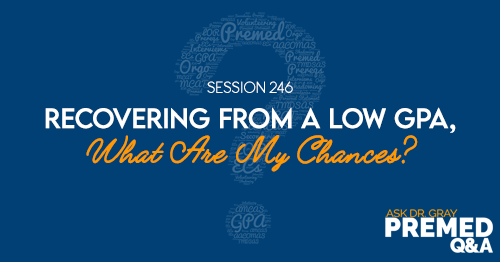Apple Podcasts | Google Podcasts
Session 120
This student has a low GPA but a solid upward trend at a community college. Should she apply this cycle or delay and complete a Master’s at a prestigious school?
Listen to this podcast episode with the player above, or keep reading for the highlights and takeaway points.
By the way, the episodes in this podcast are recordings of our Facebook Live that we do at 3 pm Eastern on most weekdays. Check out our Facebook page and like the page to be notified. Also, listen to our other podcasts on MedEd Media. If you have any questions, call me at 617-410-6747.
[0:17] Question of the Day
Q: “I have been working on a do-it-yourself postbac. I emailed you and we corresponded for a little bit. Your recommendation was to go back and redo some of my undergraduate credits and add a little bit more to get my cumulative GPA and my science GPA at a level where I won’t immediately get cut off from schools.
I started off with a cumulative GPA of 2.82 based on what the AMCAS test calculates, and a science GPA of 2.59. I went to UC Berkeley in California which is very competitive. There were a couple of things that went on there. I was an athlete. I also came from a different educational system in Europe and I was used to the final exam counting as my overall grade.
I’ve now learned that every single assignment counts. Adding every single point from every single homework is what’s going to get me from a B to an A, or a C to a B. Since learning that and graduating, I’ve been taking community college classes where I live and I’ve taken 27 units that have 4.0 straight A for the last year.
With COVID, I started off in-person, some of those have been hybrid, some of them have been online. I just kept chugging along knowing and hoping that medical schools would understand that. So now my cumulative GPA is 3.01 and my science GPA is 2.89.
I did take a second associate class that I needed as prereqs that I hadn’t had before. I’m going to be taking two more courses this semester. Hopefully, by summer, if I keep with that straight-A, I should be at a 2.96 science GPA. I know that if I take one or two more classes in the summer, I should reach that 3.0.
My question is, do I need to go to that 3.0? Do I need to overshoot it? How high should I go?
Before you answer that, I’m also applying to a Master’s. I have the opportunity with a really great graduate school reimbursement program through my employer. They’ll be paying back for the majority of my Master’s. I’m hoping to do a Masters of Science in Molecular Pharmacology and Experimental Therapeutics, which goes really well with what I’m currently working in.”
Given that I would start, if accepted, the Master’s program in the summer, I plan to retake the MCAT as well as part of it. This Master’s is a very flexible program that allows for me to work full time while taking it. I can go up and down in courses.
I’m probably applying in 2022 with the idea of repeating the MCAT. At some point, I got a 5.01 on my first try. I’m repeating the MCAT to get a much higher and more competitive score based on all this work I’m doing and all these hours.”
[4:19] Is a Master’s Program Worth It?
Our student adds that she’s nervous because she’s taking community college classes. And she thought that taking the Master’s classes at a prestigious university would help her prove her academic excellence.
But to me, the master’s is a waste of time, and that if you really want to apply, then do it in 2021.
Students typically do well in Master’s programs – or you don’t finish it or just drop out. And it’s going to be a weird situation to have really solid upward trends of 30 credits at a 4.0 if you were to apply in 2021.
Yes, it’s a community college but you have an interesting story of being an immigrant to this country and an athlete in college. It’s not like you just struggled at the university with hard classes. You struggled because it wasn’t your focus, you adjusted to a new culture, you were an athlete.
You have this interesting story to tell as to why you struggled early on – learning this new educational system, stopping being a student-athlete, being able to focus on school, and now you’re crushing it.
So your master’s is going to be largely covered but there’s still an expense and time delay to that. And whether it’s worth it, in the end, to have a “prestigious” name behind you is something I would argue about. I almost never recommend going for the prestige because it usually doesn’t work that way.
If you want the master’s degree because you’re thinking that you’re going to use some of those skills and knowledge in your practice as a physician, then great. But I’m wondering if you’re using the Master’s as a crutch because you’re doubting your ability to get in with where you’re currently at.
[7:06] Doing a Master’s to Prove Myself Academically
Our student says there are multiple different ones she could have applied to and there’s genuine interest there. She’s not worried that she won’t put in the time or that she won’t find it interesting.
She already took one class as a way to prove herself academically to them. Her grade is not back yet. She was probably at 94%. She found it challenging and refreshing to learn new things. However, part of the reason was to prove herself academically.
“Do what's best for you.”Click To TweetPersonally, I don’t think you need to do it. Having below a 3.0 science and cumulative GPA stings. Your total numbers are scary looking in the grand scheme of things.
A lot of students don’t really understand the process, the upward trends, and how impactful that is. You definitely have a lower GPA and the Master’s is a “separate” line on the application. That may help but is it worth delaying the application for another year?
The one benefit of delaying until 2022 is you can take those summer courses and have that GPA impacted on your application. If you were to apply in 2021, those courses wouldn’t be part of your GPA calculation so your science GPA would be below 3.0.
Our student explains she could add another class which starts next week. She has done it before, where she took three undergrad classes. She’s in the process of switching to a job that will meet her financial needs. And this will also give her so much more time. She’s taking a step back from patient-facing to have time to really focus on studying on the MCAT. It was a hard decision for her but she knows that she needs to focus academically.
So the other 800-pound gorilla in the room is if you speed up this process and apply in 2021. There’s the MCAT, and if you were to add an extra class, do you have the bandwidth for school and work? That’s probably the bigger variable that will determine when you’re going to apply.
[10:17] Delaying and Doing a Master’s
Q: “I think I can definitely do better than 5.01. If I’m going to delay in order for me to take the MCAT, then why wouldn’t I do the Master’s? If it’s going to be pretty much covered and I can do it?”
A: There’s no reason not to if you’re going to delay anyway. If you feel like you want to, you’ll be interested in it and you’ll do well in it, then do the Master’s. You need to do well in it. If it’s mostly covered and it’s not a big financial burden, why not?
Ultimately, our student wants to spend her time and doesn’t want to rush it. She thinks it’s worth delaying for a year and having the best possible application that she can put forward.
[11:35] Retaking Classes at a Different Institution
Q: “For example, I took general biology at Cal and we did it at my community college. It was Human Biology. If I retake a class at a different institution, is it considered a repeat? Is it a different course if it’s a different institution? I know that AMCAS won’t do any grade replacements. I was just curious as to how that looks.”
A: I would recommend looking at the instruction manual. If it’s a different institution with different courses, it’s most likely not going to count as a repeat. It needs to be the same institution, same course number, etc. At the end of the day, it doesn’t matter.
[12:34] Pass/No Pass
Q: “Do Pass/No Pass credits count as part of my PCMP? I was putting in all my grades into Mappd. Even if they were part of the Biology department, even if they were research, do I check them?”
A: No. Pass/No Pass equals zero credit.
“Pass/No Pass equals zero credit.”Click To Tweet[13:18] Having Master’s Credits
Q: “Does it matter how many credits from my Master’s I’ve completed by the time I apply? I was aiming to be about halfway done.”
A: Probably having some credits will look good, as close to a 4.0 as possible. You don’t need to finish your Master’s before you apply but having some courses will help.
[13:45] Is a 3.0 Science GPA Enough?
Q: “For my science GPA, is it enough to get it to a 3.0? Should I try to overshoot it a little bit?”
A: Get as high as you can. You don’t need to overlap undergrad classes with your Master’s program. Do what you can to get above a 3.0 in both science and cumulative and then call it quits from there.
[14:12] Tweaking the Application
Q: “Looking at a reapplication, I know I will need to update my essay. I know parts of it will stay the same because of stuff that hasn’t changed. But when I’m reflecting on my experiences and activities, can I have the same essays for activities that I’m no longer doing?”
A: I wouldn’t keep anything the same. I would tweak as much as possible. More than likely last time you applied. I’ve come out with a video on how to write extracurricular descriptions where you can improve your activity descriptions.
[15:03] Getting More Shadowing Hours
Q: “I have a lot of hours of scribing, which I know doesn’t really count for all schools as shadowing. I have shadowed internationally at a learning hospital in Spain. Would it still be very important for me to have shadowing here?”
A: Probably as much as you can, if you can.
“Scribing is going to be considered shadowing for a lot of institutions.”Click To TweetIt sounds like you’re doing a lot. The goal and the focus is schoolwork to get above that 4.0. And then if you can fit in some stuff, then great.
[16:03] Switching Jobs
Q: “I recently switched jobs. I was a clinical research coordinator. It’s been amazing. I’ve had so much one-on-one time, looking at Phase 1 and 2 clinical trials and working with patients.”
I’m taking a step back from that and switching into a clinical laboratory position. It will no longer be patient-facing but I’m hoping that this job will give me the space and time to study. Do you think that’s okay?”
A: I’m not a huge fan of that big switch if you’re not finding time to do other clinical things. In my mind’s eye. I don’t like huge gaps in non-clinical activities.
“If you're replacing a clinical thing with a non-clinical thing and not doing any other clinical things, then that's a potential issue.”Click To TweetNow, it depends on what you’re doing. The other thing you mentioned is, you were a clinical research coordinator. A lot of your time is spent on shadowing.
And so, as a clinical research coordinator, you could extract those shadowing hours out of that job. Put them in your application and then adjust your total hours for the clinical research coordinator to match that.
Links:
SEARCH SITE
LISTEN FOR FREE












